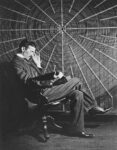Frank Abagnale
He has achieved legendary status among con men by pulling off some of the most outrageous, brazen and unbelievable deceits in the history of fraud. By the age of 21, he had impersonated a Pan Am pilot, a pediatric supervising doctor and a lawyer, charming everyone he met and bouncing checks all over the world. In this week’s Biographics, we take a look at the incredible story of Frank William Abagnale.

Early Life
Frank William Abagnale was born on April 27th, 1948 in New Rochelle, New York. Named after his father, who owned a stationery business, Frank was the third of four children. His mother, Paulette, was of French-Algerian extraction. The couple met while Frank, Sr. was on active service in Algiers during World War 2. They were soon married despite a thirteen -year age gap.
Frank, Sr. proved to be a very successful businessman with the stationery store doing exceptionally well. As a result, the family lived in a large home and, although the Abagnale’s were by no means rich, Frank. Jr and his siblings had a comfortable childhood.
A Family Torn Apart
Frank attended Ioana Catholic School in Westchester, New York. His world was turned upside down in 1960, when his parents separated. This came as a shock to all the children, who thought that their mother was a contented housewife who had everything she ever wanted. However, Frank Sr. was very active in local body politics, as well as being active in the management of the New York Yacht Club. In addition, he was a very keen deep-sea fisherman. All of these interests meant that he was often away from home. One day he came home from an overseas marlin fishing adventure to find that his wife and four kids had moved out.
Frank Sr. was crushed by the separation. He deeply loved his wife and fought to get her back until the day he died. But Paulette’s mind was made. As a sign of independence, she enrolled in dental college and began building a life of her own.
Frank Sr. recruited Jr. to help him win back Paulette’s affections. He would give his son gifts to pass on, schooling him just to what to say and how to say it. But Paulette wouldn’t budge. The couple divorced when Frank was fourteen.
Living with Dad
Unlike his siblings, Frank chose to live with his father. This opened up a whole new world for the teenager, who had been used to a regimented and disciplined life with his mother. Tagging along with his dad, he began spending time in the bars around New York as Frank Sr. wheeled and dealed amongst the city’s businessmen and politicians. The experience quickly made the boy street-wise.

It was around this time that Frank began to skip school in order to run with a handful of local punks who were, like him, from dysfunctional families and seeking some way to express their frustrations. Frank was bigger and more mature looking than his associates, which was handy when it to came to playing hooky – he was often mistaken for a teacher on an outing with students. The group committed minor crimes like sneaking into movie theaters and stealing candy.
Frank soon became frustrated at the childishness and lack of sophistication of his partners in crime. They didn’t exhibit any of the class that he had realized was the key to making it as a successful criminal. Things came to a head when his mates stole a car while the owner was watering his lawn. They swung by to pick Frank up only to be stopped by the police moments later.
Frank and his fellow cons were thrown into juvenile detention. Frank Sr’s political connections managed to get his son sprung and to have any mention of the incident erased from the record.
Frank’s dad told him that he was wasting his time hanging around kids who were clearly not as mature or sophisticated as him. It was time to start acting like a man. The pep talk seemed to do the trick and Frank began attending school regularly. He also got a part time job as a shipping clerk at a warehouse in Bronxville. To show his support for his son’s change of direction, Frank Sr. bought him his first car – an old Ford.
Wheels and Girls
Having a set of wheels opened up new horizons for young Frank. Specifically, it allowed him to meet and enjoy the company of girls. For the next couple of years, by his own admission, he was consumed with satisfying his teenage libido. He would cruise around town, prowling for a young lady that he could entice with his ever-growing charm into an evening of intimate activity.
Frank soon discovered that his sexual excursions cost money. Invariably he’d have to supply his conquest with a coke and a burger in order to keep her happy. The problem was that his meager finances didn’t allow for such an expense.
Frank approached his dad and requested a gas charge card. He promised that he wouldn’t abuse the privilege and his father was impressed with his sincerity. He handed his Mobil card over to his son.
A month later, Frank enacted his first scam. Pulling into a Mobil gas station he saw a sign announcing that you can put a new set of tires on your car and charge it to your Mobil Card. It was then that he realized that you could use the card for other things aside from gas. Thinking fast, he approached an attendant at the station that he was familiar with.
Frank asked what it would cost for a new sets of tires – the answer was $160. Frank readily acknowledged that he didn’t need new tires but said that he was desperately short of cash. So, he suggested that he buy the set of tires and charge them to the card. But rather than taking the tires, the attendant would give Frank a hundred dollars for them. He could then sell off the tires for $160, making a quick sixty-dollar profit.
Ten minutes later Frank drove away from the Mobil with a hundred dollars cash in his pocket. He was hooked.
Over the next few weeks, Frank replicated the scheme at different Mobil stations around the Bronx. At times he would simplify the deal, offering the pump attendant to give him ten dollars of cash while signing a bill for a twenty-dollar gas sale.
It was only when the bill from Mobil arrived that Frank realized that his father was the chump who would pay for his excesses. But Frank had a simple solution- he threw the bills into the waste bin. Of course, that didn’t solve anything. Pretty soon, a Mobil representative visited Frank Sr. at his store and requested an explanation for an outstanding $3,400 bill in 3 months after 15 years of impeccable payment history.
Frank Jr. was called in front of both men to explain. He said he didn’t know what they were talking about, but neither man was convinced. Finally, Frank admitted it, but quickly offered the ultimate excuse . . .
It’s the girl’s dad – they do funny things to me. I can’t explain it.
His father nodded with a wry smile and replied . . .
Don’t worry about it, boy. Einstein couldn’t understand it either.
Unfortunately for young Frank, his mother wasn’t so understanding. She blamed his criminal activity on the influence of his father and promptly organized for him to attend a Catholic private school for problem children. Frank spent a year there. During those twelve months his father’s financial fortunes took a steep reverse and he lost almost everything. He was quick to assure his son that the $3,400 that he had stolen was not a factor in his money problems.
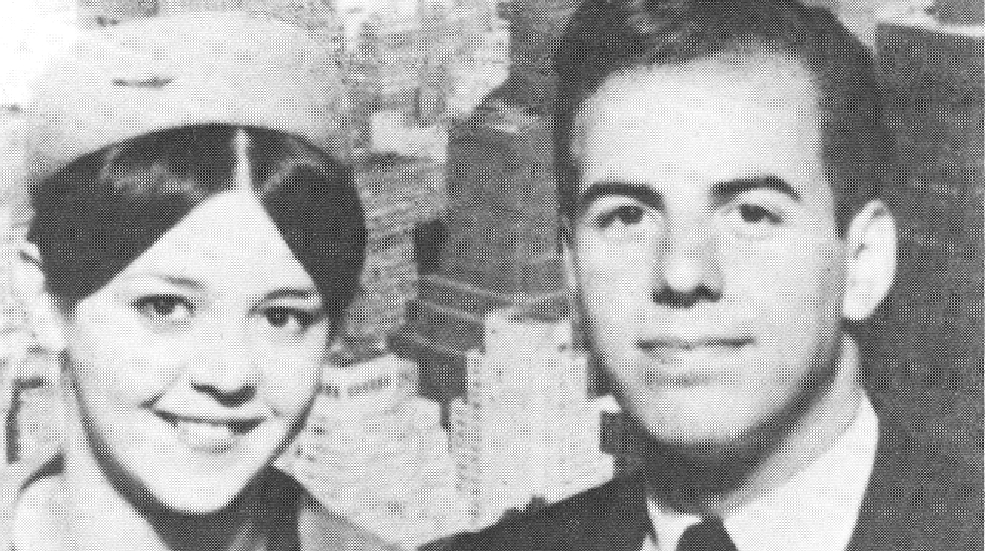
On His Own
Frank left home at 16. He left without saying a word to anyone, hopping on a train to New York City. Along with the few belongings that he’d crammed into a suitcase, he had in his possession a check book that had $200 in the account. An hour off the train he had attached himself to a teenage boy and convinced him to take him home with him. Frank went on to spin a story about being an orphan and that he was determined to make it on his own in the big city. The parents offered for him a stay to as long as he wanted it.
The next day Frank got a job as a stock clerk for $1.50 per hour. He quickly found out this was not going to pay his way in New York. He figured that the reason for his low wage was his age. So, he simply altered the date of birth on his driver’s license from 1948 to 1938. Now, as a 26-year-old, he went out looking for another job. He found one as a truck driver’ helper for $2.75 an hour.
Frank supplemented his income by cashing checks from his account. After a couple of days, he knew that his account was overdrawn, but that technicality didn’t phase him. He continued writing bad checks on a daily basis. It didn’t take him long to rationalise that his time working for $2.75 an hour was not worth his effort. So, he quit and simply wrote more bad checks.
Pilot
One day, while walking along 42nd Street, Frank was stopped in his tracks at the sight of an aircrew from Eastern Airlines emerging from the Commodore Hotel. He was mesmerized as the captain, co-pilot, flight engineer and four stewardesses breezed by. Frank wrote in his memoir that he had never seen such a splendid group of people.
His mind began to work overtime. Imagine if he were a pilot. He would have instant respect – and, as a result, would be able to cash checks anywhere with impunity. Continuing down the street, he found himself outside of the Pan Am building. Quickly he formulated a plan. He returned to his accommodation, found Pam Am’s phone number, rang and asked to speak to someone in the purchasing department. He went on to inform the purchasing officer that he was a Pam Am pilot based in Los Angeles. He was due to hop a flight back home at 8 pm, but his uniform had been stolen. He confidently requested a replacement uniform.
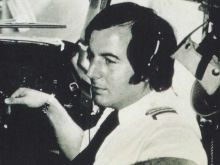
The helpful purchasing officer gave Frank directions to the uniform company to pick up his uniform. He walked out with a complete co-pilot’s uniform in hand. What he needed now was a pilot’s ID card. He quickly had one made up, affixing the Pan Am logo from a model plane that he purchased for $2.49.
Decked out in his Pan Am uniform, Frank walked into La Guardia airport. He was soon approached by a TWA co-pilot who asked what Pan Am was doing at La Guardia. It turned out that Pan Am did not fly out of La Guardia. Picking up on his research, Frank replied . . .
‘oh, I just deadheaded in from Frisco on the first flight I could catch. I’ll catch a chopper to Kennedy’
This answer seemed to satisfy. But then the co-pilot asked . . .
What kind of equipment you on?
This threw Frank. In his research, he hadn’t come across the word equipment used in that context. Searching for the right answer, he came out with . . .
General Electric.
The pilot was actually asking what type of plane Frank flew so the quizzical look on his face at this reply was understandable. Frank quickly made his departure. He didn’t attempt to board a plane that first day. He was to spend some weeks getting confident in his role as he wandered the airport, struck up conversations with pilots and built his store of ‘shop knowledge’. During this time, he also found great success in cashing checks in his pilot’s uniform. In fact, the tellers couldn’t give him the cash fast enough.

Finally ready to take to the skies, Frank turned up at La Guardia’s Eastern Operations office and informed the desk clerk that he needed to deadhead to Miami on the next flight, assuming that there was room on the plane. Deadheading was the name used for the practice of allowing staff to travel for free in order to get to a job location. He was told there was a vacancy on a flight departing in fifteen minutes. Within minutes he found himself in the cockpit sitting in a tiny seat which came down from the door behind him. With him were the pilot, co-pilot and flight attendant. After asking what type of equipment he flew, the three pretty much ignored him for the rest of the flight. Before getting off at Miami, Frank made a date with one the stewardesses who was laying over in Miami that night.
Amazed at how simple the whole process had been, Frank became a serial deadheader. Upon arriving in a city, he would stay overnight in a motel used by Pam Am staff, charge the bill to the company, and in the morning, before heading to his next deadhead flight, cash a bad check for a hundred or more dollars just to have some ready cash. This pattern continued for two years, between the ages of sixteen and eighteen, taking him to twenty-six countries on more than 250 flights that covered in excess of a million miles.
Doctor
By the middle of 1966, Frank was ready for a new gig. He had experienced a close call when someone had stated that he didn’t actually work for Pan Am. Fortunately, his bluster and feigned outrage got him through the challenge but he knew that eventually the game would be up.
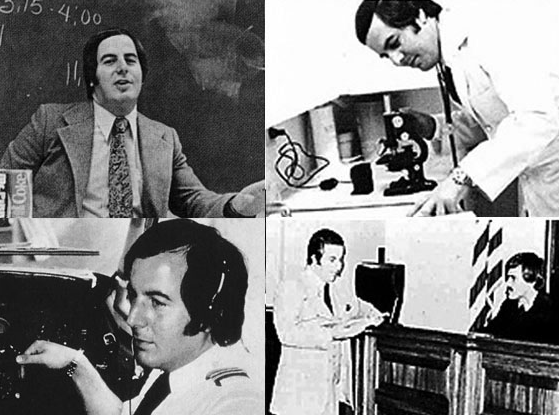
It was when applying for a long-term lease on an apartment in Atlanta, Georgia that he, on a whim, wrote down his profession as medical doctor. When asked what type of doctor he was, he replied that he was a pediatrician, based in California but was on a 12-month sabbatical to audit some research papers. Things went well for a period of time, until one day he got a knock at the door. His new neighbor introduced himself – Dr. Willis Granger, chief resident pediatrician at the Smithers General Hospital in Marietta.
Frank was afraid that Granger would blow his cover but, fortunately the real doctor wasn’t one to talk shop and they were able to cross each other’s paths without incident. Meanwhile Frank spent as much time as he could at the local library reading up on the subject of pediatrics.
A few weeks later Frank felt confident enough to accept an offer from Dr. Granger to tour Smithers General Hospital. After that he made regular visits. On one such occasion he was approached by the hospital administrator and asked to do him a huge favor – could he cover a midnight to eight shift for a doctor who would be away for ten days due to a death in the family?
Frank objected that he didn’t have a licence to practice in Georgia. But the administrator countered that he wouldn’t really be doing anything during the night shift, just overseeing interns and nurses. So long as he passed an interview panel of five doctors everything would be fine.
Frank’s initial impulse was to refuse – there were too many dangers involved. But he was so intrigued with the challenge. And so he agreed.
Much to Frank’s relief, the interview was light-hearted and non-inquisitorial. He was now a night shift pediatric supervising doctor with 8 interns and 40 nurses under his control. In order to make it through, Frank took on the persona of rule-breaking anti-establishment practitioner in the mold of Hawkeye Pierce on his favorite TV show, MASH. Things went smoothly until he was called to the emergency room. He took his time getting there, hoping that an intern would step in. When he finally arrived, there were three interns gathered around the patient. Frank asked them for their diagnoses, and when all three agreed he told then to go ahead with the procedure.
At the end of his ten-day stint, Frank was approached by the administrator and informed that the doctor he was replacing was not coming back. Could he possibly stay on until a replacement could be found? He ended up spending 11 months as a doctor at Smithers Hospital.
Lawyer
After finishing up at the hospital, Frank decided to leave Atlanta. He moved to Baton Rouge, Louisiana where he met up with a flight steward that he had formerly had a relationship with. Remembering that Frank had told her about his (supposed) law degree from Harvard, the girl introduced him at a party to assistant state’s attorney, Jason Wilcox. On learning that Frank was currently out of work, Wilcox told him that the Attorney General was looking for bright articulate young lawyers. Why didn’t he take the bar exam and practice with them?
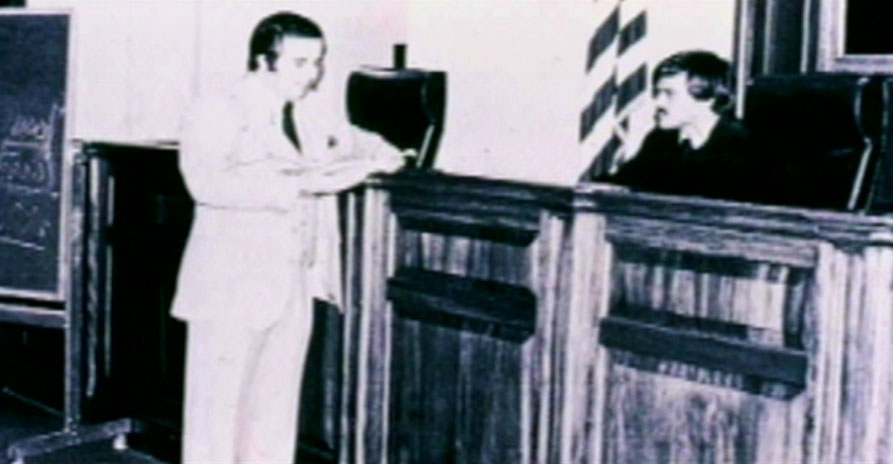
Once again, Frank found it impossible to resist the challenge. On his third attempt he passed the bar exam. He was given a position in one of the Attorney General’s civil departments. The job was really that of a glorified errand boy, but Frank was happy in the anonymity of the role. Around this time, he began dating a girl named Gloria, who was a staunch Methodist. Through this relationship he ended up on a church committee, sitting alongside a man who was a real graduate of Harvard Law School. This guy began asking too many specific questions and Frank knew it was time to pull the plug on his law career.
Frank next turned up in Utah, where he claims to have scammed his way to becoming a teacher at Brigham Young University for eight months. However, the university denies that he ever worked there.
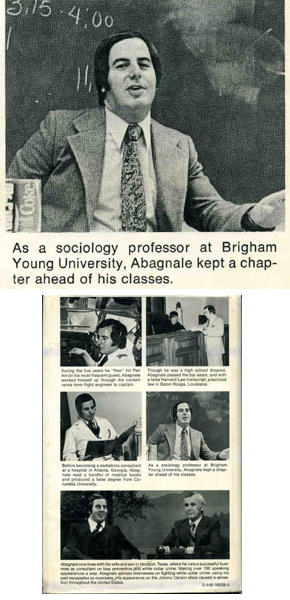
Prisoner
By now Frank was wanted in many parts of the world for a long list of fraudulent activities. The FBI were on his trail, as was Interpol. His luck finally ran out while he was spending time in the southern French town of Montrichard. He was arrested on the basis of an Interpol warrant for fraud issued from Sweden for fraudulent checks written during a visit while he was supposedly a Pan Am employee. The French authorities soon discovered that he had written false checks all over their country also and so they refuse to honor the extradition.
Frank was sentenced to 12 months imprisonment in France, which, after being reduced to 6 months, was served at Perpignan prison. Conditions were abysmal and Frank’s weight went from 198 to 109 pounds during his stay there. He was then extradited to Sweden where he served another six months imprisonment.
Upon his release from Malmo prison in Sweden, Frank was taken into custody by US Federal officers and returned to the United States. After a third trial, he was convicted to twelve years imprisonment for multiple cases of fraud. During his time in US custody he escaped twice but was recaptured on both occasions.
Going Straight
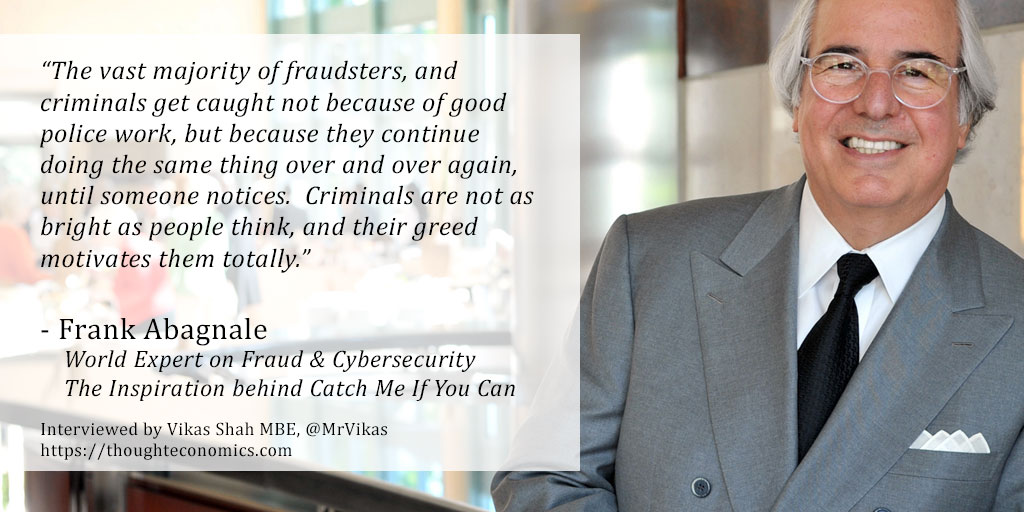
After four years jail, Frank was offered a deal – his prison term would be quashed if he agreed be an on-call consultant to assist the authorities to investigate fraud cases.
Frank agreed.
After his release from prison he took on a succession of menial jobs, only to be fired for not revealing his criminal past. He then decided to parlay his vast criminal experience into a legitimate career by becoming a security consultant and advising companies as to how they could avoid the sorts of scams that he had perpetrated for so long. He went on to set up his own fraud protection company, Abagnale and Associates. He has been advising the FBI on fraud related matters for more than 40 years.
Frank Abagnale, aged 70 in 2018, lives in Charleston, South Carolina, with his wife Kelly. They have three sons, one of whom works for the FBI.
Sources:
Catch Me If You Can by Frank Abagnale (Kindle Edition)
Encyclopedia of White Collar and Corporate Crime by Lawrence M. Salinger (Kindle Edition)
Frank Abagnale:’Catch me If You Can’ – Talks at Google (YouTube) https://www.youtube.com/watch?v=vsMydMDi3rI



